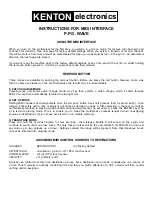
MIDI CONNECTORS
MIDI IN should be connected to a MIDI OUT or a MIDI THRU similarly MIDI OUT should be connected only to a
MIDI IN and a MIDI THRU should also be connected only to a MIDI IN.
MIDI OUT is the signal from the synthesizer (or drum machine etc.) that is to be sent to another instrument. MIDI
IN is a received signal that contains MIDI information from another synth, and MIDI THRU is an exact copy of
information arriving at the MIDI IN socket. This allows several instruments to be connected together.
If you want to wire your own MIDI cables the following information may be useful.
1) Although a 5 pin connector is used, only two connections plus an
earth connection are required.
2) If you look at the din plug from the wiring side you will see that the pins are numbered. From left to right (or
clockwise) these are 1 - 4 - 2 - 5 - 3.
3) The pins numbered 1 & 3 are not used.
4) The screen (earth) is connected to pin 2 (centre pin)
5) Pin 4 of one plug should be connected to pin 4 of the other
6) Pin 5 of one plug should be connected to pin 5 of the other
7) You should now have a working MIDI lead
8) It is preferable to label one end of the cable MIDI IN & the other end MIDI OUT, to avoid confusion.
WARRANTY
All Kenton MIDI Kits come with a 12 month (from purchase date) back to base warranty, (i.e. customer must
arrange and pay for carriage to and from Kenton Electronics).
Copyright (c) KENTON Electronics & John Price 1986-2001
KENTON
electronics
Brookfarm House, Station Road, South Wimbledon, London, SW19 2LP, UK.
Tel +44 (0)20 8544 9200 Fax +44 (0)20 8544 9300
www.kenton.co.uk
e. & o. e. PPG24112/9112181240/JKP






















